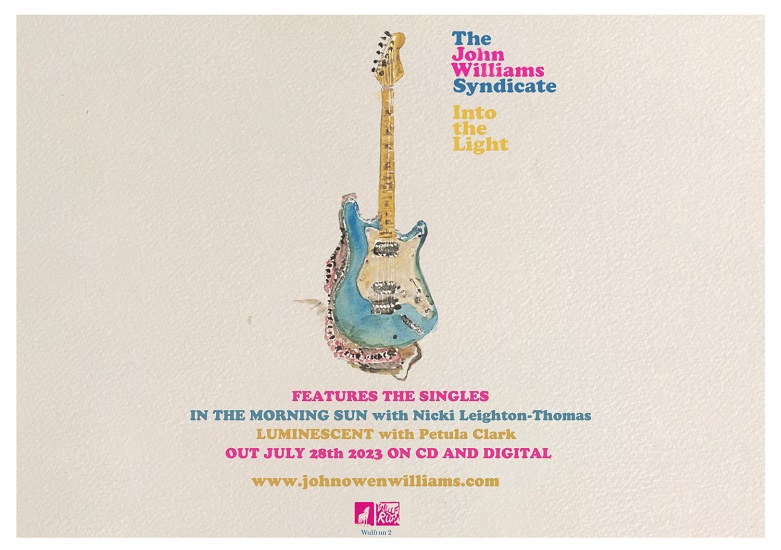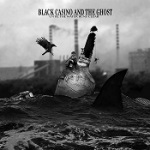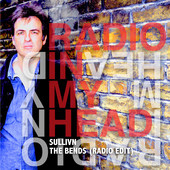
‘Into the Light’ is the second John Williams Syndicate album. My only minor reservation about the first album ‘Out of Darkness’ (both titles inspired by the motto of his hometown, Wolverhampton) was that with so many guest performers it lacked a little bit of cohesion. That certainly doesn’t apply to ‘Into the Light’. There’s still a long list of guest performers but John has conjured up a unity for the album with a sixties feel combined with twenty-first century production techniques that makes it feel simultaneously contemporary and nostalgic, drawing on all of his previous experience as record plugger, label manager, head of A&R, producer, songwriter and recording artist.
For the second album, John has stuck with the idea of combining established artists with relative newcomers to the business. There are guest vocals from the legendary Petula Clarke, Claudia Brücken, Nicki Leighton-Thomas and John Moore (of Jesus & Mary Chain and Black Box Recorder fame) while the relative newcomers and under the radar guests are represented by Natasha Panas, rapper/singer Slicko and Isabella Coulstock (currently supporting The Who after a tour supporting Jools Holland). John blends all of these elements together seamlessly with his arrangements and production.
Of the ten tracks on ‘Into the Light’, there isn’t one that has the finger even hovering over the skip button and they work beautifully together, however I do have to mention a few of my own personal highlights. ’You’re My Number One’ works perfectly on all levels; it’s a list song packed with sixties and seventies references driven along by an incredibly catchy guitar hook and a Nicki Leighton-Thomas vocal at the lower end of her range that evokes Marianne Faithfull from her gravelly ‘Broken English’ incarnation. ‘In My Dreams’ is also full of musical and lyrical historical references. Petula Clarke shines vocally on ‘Luminescent’, which is driven along by a simple repeated piano figure, while Claudia Brücken does the same on the Portishead-influenced ‘As Long As You are there for Me’ which builds gradually from a drum pattern and guitar feedback before finishing on stripped-back piano and vocal. ‘I Want to Lose Myself in You’ is a bit of fun that opens with an organ intro that hints at Vanity Fare’s ‘Hitchin’ a Ride’ and maybe ‘I’m Always Touched by your Presence Dear’. Just imagine Blondie with a banjo.
It’s also great to see that John, as he did with ‘Out of Darkness’, is bucking the streaming/download trend. The CD version of this album comes with sumptuous packaging that enhances the musical experience. ‘Into the Light’ succeeds in the same way that St Etienne did in the nineties by capturing the mood and feel of an earlier while era using contemporary production techniques. It’s a tricky one to get right, but this album aces it.
‘Into the Light’ is released on Friday July 28th on Wulfrun Records (Wulfrun2).
Here’s the video for ‘In the Morning Sun’:
 We’ve been waiting for this one for a while now, and I’m chuffed to say it was well worth the wait. The second Black Casino and the Ghost album, “Until the Water Runs Clear” is packed with great individual performances, but the great strength is the way they work together as a band. Elisa Zoot’s voice is stunning and Ariel Lerner’s guitar playing is faultless across a range of styles, but Paul Winter-Hart (drums) and Gary Kilminster play a huge part in the band’s sound, supplying the rhythmic pulse and some melodic and inventive basslines.
We’ve been waiting for this one for a while now, and I’m chuffed to say it was well worth the wait. The second Black Casino and the Ghost album, “Until the Water Runs Clear” is packed with great individual performances, but the great strength is the way they work together as a band. Elisa Zoot’s voice is stunning and Ariel Lerner’s guitar playing is faultless across a range of styles, but Paul Winter-Hart (drums) and Gary Kilminster play a huge part in the band’s sound, supplying the rhythmic pulse and some melodic and inventive basslines.
There are some influences which are woven through the album; there’s more than a hint of sixties pop, and a hint of psychedelia channelled through the trip-hop filter of Portishead and Massive Attack or the shimmering nineties pop of Saint Etienne and Morcheeba. So the obvious opening song is one which sounds like early English folk, isn’t it?
“The Pool” proves that Elisa can do the quieter, more reflective songs as well as the belters, starting with a finger-picked acoustic guitar backing and multi-layered backing vocals, adding shards of percussion, synths and slide guitar before dropping back to the minimalist guitar backing. After the trippy feel of “Age of Contagion” and the monster guitar riff of “Veggie Tarantula” (the two singles so far), it’s a bit of a departure but it’s very effective.
The sixties influence is clearest in “Soul Mall”, the bass-led “Sherry” where Elisa delivers the verses in a cool, almost dismissive style, and “Mr Puppeteer” and “Hoochie Coochie Lover” where Ariel plays in a clipped, precise style that’s very Hank Marvin, or maybe it’s just like Eddie. Apart from the obvious “Lucifer, Lucifer, Lucifer”, there’s a darkness and obsession suffusing the album, and it surfaces in lines like ‘Wish I could skin you, look at what’s in you’ in “Hoochie Coochie Lover”; it’s challenging and not always comfortable but, if comfort’s what you want, you should be listening to Smooth Radio.
There are still a few more stylistic twists and turns to the album; “Tarjeteros” has an Ennio Morricone feel, “Bitter Beast” contrasts a verse with a hint of Bjork with a wall of sound chorus, while the album’s last song, “Solar Storm”, closes the circle with Elisa’s controlled vocal over a sparse arrangement that builds with keyboards and backwards effect before fading into the ether.
I don’t think I’ve heard a better album than “Until the Water Runs Clear” this year; Black Casino and the Ghost have created an album that’s full of hooks to grab your attention, but is full of dark and mystical undercurrents to keep you enthralled.
“Until the Water Runs Clear” is out now on Amazon and iTunes. Go on, treat yourself to an early Christmas present.
If you want to see Black Casino and the Ghost live (and you really should), they’re playing at The Finsbury on December 8th and it’s completely free.
 In many ways Tahliah Barnett still sounds like many thought the future would in 1995. More sinuous and fragile maybe, but twenty-six year old FKA Twigs is much indebted to the Bristol’s trip-hop takeover in the mid-nineties and in particular Adrian Thaws, AKA Tricky. Along with Massive Attack and Portishead, Tricky defined the period with his doomy and sensual debut album “Maxinquaye” which featured soulfully threatening vocals from his favourite muse Martina Topley-Bird, and it’s this artist who springs to mind more than any other whilst listening Barnett’s vocal abilities. Against the skipping, tapping and whirring percussion noises, sporadic booming bass and hip hop and trap time-signatures, Barnett delivers two variations – a barely-there, traditional r’n’b fluttering falsetto and a surprisingly clear contralto; a marvellous, devastating contrast frequently exchanged during the same song.
In many ways Tahliah Barnett still sounds like many thought the future would in 1995. More sinuous and fragile maybe, but twenty-six year old FKA Twigs is much indebted to the Bristol’s trip-hop takeover in the mid-nineties and in particular Adrian Thaws, AKA Tricky. Along with Massive Attack and Portishead, Tricky defined the period with his doomy and sensual debut album “Maxinquaye” which featured soulfully threatening vocals from his favourite muse Martina Topley-Bird, and it’s this artist who springs to mind more than any other whilst listening Barnett’s vocal abilities. Against the skipping, tapping and whirring percussion noises, sporadic booming bass and hip hop and trap time-signatures, Barnett delivers two variations – a barely-there, traditional r’n’b fluttering falsetto and a surprisingly clear contralto; a marvellous, devastating contrast frequently exchanged during the same song.
t may not be 1995 anymore and explicit and unimaginative sexuality has replaced mystery and ambiguity and this is what has partly driven what seems an uncommonly insatiable appetite for this young singer who almost constantly remains somewhat hidden in all respects. “LP1” was preceded by two 4-track EPs which have served as an introduction to the singer (none of those tracks are included here) and accompanying each of these songs was a highly stylised video; no-one could tell who this person was though, so obscured by the surreal and vivid images – a slippery and repeatedly oral Chris Cunningham cum Grace Jones “Corporate Cannibal” body-morphing aesthetic. These portraits proved irresistible and have made FKA Twigs the absolute doyenne of tumblr cool; the hype starts here indeed. Stripped then of these visuals as one is when listening to the 10 tracks here (at the time of writing only one song has visual accompaniment), the overall impact is not always as strong when relying entirely on melodic and sonic ability but a lot of the time it exceeds what has been heard to date such is the strength of the song writing.
“Two Weeks” is a massive and masterful song, the highlight of “LP1”, and its straight-out-of-the-box perfection would be an achievement for any artist, new or established. Staccato delivery and clipped annunciation surround the only explicit references to sex, and sexual competitiveness, on the album. ‘I can fuck you better than her…..my thighs are apart for when you’re ready to breathe in’ is an example of this but it’s the reference to ‘pull out that incisor’ and ‘flying like a screaming falcon’ that add another altogether otherworldly layer that so befits what we know of Barnett, a darker and by far more disturbing extreme to go to. “Video Girl”, like “Two Weeks”, is another of the more typically structured and sturdier songs which will have people reeling off names like Brandy, Aaliyah and Tweet – sweet-voiced r’n’b artists who actively encouraged producer involvement to create music that was bleaker and more experimental than the norm expected at the time within the genre. But “Video Girl” is autobiographical; it references her time as a dancer in music videos by the likes of Jessie J and Kylie Minogue immediately before this album’s release and the subsequent change of hierarchy. ‘Is she the girl that’s from the video?’ leering demand is met with Barnett’s subsequent denial ‘I can’t recognise me’. The second chorus slows down just enough for the listener to think there may be a fault with their copy of the track, as though it’s malfunctioning; it’s a disquieting and magical little trick.
“Hours” creaks up slowly like a sticky corrugated shutter, produced by indie female favourite Dev Hynes, and has the best example of this soft / hard vocal dynamic where the later verses become strident demands as opposed to the earlier girly infatuations. “Closer” is sublime Gregorian chamber pop ending with the devastating (I think) ‘all these years in isolation, isolation, isolation’ and “Give Up” sees the singer take the role of forceful encourager and rock. “Pendulum” starts with the clack of a stick being rattled around a cotton wool lined barrel with Barnett sounding as though she may dissolve into the background due to emotional upheaval. It’s one of the songs here, and odd therefore that it’s the sole production by pop god Paul Epworth, that feels pleasant enough but inadequate – the most surprising thing you could say about Barnett, certainly. But it’s misleading as eventually it becomes somewhat of a centrally-placed heart to the album and its warmth burns through you. “Lights On” and album closer “Kicks” are at the weaker end of “LP1”, both tracks promise something that never fully develops or is reached and it’s here that Barnett is reminiscent of Kelela’s “Cut 4 Me” and the slow jams that appear on her album. Production levels are startlingly high and the vocals are pure r’n’b sweetness but there is a little either in the way or melody or mood here.
“LP1” is a record that at first seems to be somewhat slight considering the heft of everything that surrounds it. I was lucky enough to have this album a good two weeks before it was released and can say that after initially forming an opinion that wasn’t as favourable as this one, it kept drawing me back. It was as though I hadn’t heard all of the tracks yet but had retained enough of a clatter or a buzz or a divine falsetto being slowed down to a stuttering machine that I needed to go back and finish them properly, to give the record a fair chance. It’s only through these repeated listens that some of the tracks here really show themselves; it isn’t a slight record at all, far from it in fact. FKA Twigs debut is wholly impressive and bewitching and stands up as a cohesive and single-minded debut; let it also be known that she also wrote every track here. A brilliant and wholly exciting new talent on the British black music scene, whatever that music may be.
 Ready or not, here it comes. It’s the second single from the Radio (in my) Head project and this time it’s the turn of Sullivn putting their highly individual stamp on “The Bends”. The band are John O’Sullivan (all vocals), Layla MK Kim (piano), Simon Goudarzi (guitars), Sjur Opsal (bass) and Jon Mar Ossurarson (drums). Now, I have to be completely honest here and admit that despite loving Radiohead, I can take or leave the original of that particular song. In fact, I’d rather leave it; if you can imagine Tom Verlaine singing alternately stoned and constipated, that’s how I hear Thom Yorke’s vocal on “The Bends”.
Ready or not, here it comes. It’s the second single from the Radio (in my) Head project and this time it’s the turn of Sullivn putting their highly individual stamp on “The Bends”. The band are John O’Sullivan (all vocals), Layla MK Kim (piano), Simon Goudarzi (guitars), Sjur Opsal (bass) and Jon Mar Ossurarson (drums). Now, I have to be completely honest here and admit that despite loving Radiohead, I can take or leave the original of that particular song. In fact, I’d rather leave it; if you can imagine Tom Verlaine singing alternately stoned and constipated, that’s how I hear Thom Yorke’s vocal on “The Bends”.
This version is a very different beast, opening quietly and intimately with close-up solo vocal and piano before the guitars, bass and drums come thundering in at the end of the verse. The song, at different times, features funk elements, big distorted guitars, twin guitar parts, hints of late Beatles production and some subtle piano touches throughout. There is a tremendous attention to detail as the vocal sound moves from full and resonant to thin and distant and the guitars play power chords followed by atonal fills. You need to do two things to get the most out of this; play loud and repeatedly. Your neighbours won’t mind.
The B-side is a remix of Sullivn’s first single “Come Back”, taking the song down a very different route from the fairly straightforward ballad treatment of the original with a very trip-hop dubby feel of Massive Attack and Portishead and very heavy bass. It’s not quite full on Lee Perry dub, but there’s a lot on interesting things going on there. Possibly even better than the original single mix.
So what you get here is a Radiohead cover that’s packed with invention and great performances along with a cracking B-side. I only wish I liked the original more so I could really emphasise how much more I like this version . It’s available from Tuesday October 8 on iTunes.
 If you had given me this album, Delilah’s debut, and told me it had been in a time capsule since 1995 then I would probably believe you. I haven’t heard anything this influenced by that period’s prominent trip hop sound for a very long time but then everything comes back around again eventually I suppose.
If you had given me this album, Delilah’s debut, and told me it had been in a time capsule since 1995 then I would probably believe you. I haven’t heard anything this influenced by that period’s prominent trip hop sound for a very long time but then everything comes back around again eventually I suppose.
The surprise is that Delilah didn’t go to one of those British stage/ talent schools that Adele (there’s actually a song on here called “21” on here, it’s rubbish), Jessie J and Leona Lewis (to name just 3) went to, because Delilah sounds a little bit like all of these artists and the songs here sound as though they could be interchangeable between any these singers (and this does give a small clue that this album could only have been recorded in the last 4 years or so). The supposedly inspirational but horribly gloopy “Shades Of Grey” for example could feature as one of the many power ballads on any of those artists’ albums and in particular brings to mind Lewis’ “Bleeding Love” and Adele’s “Set Fire to the Rain” but is not as good as either. And “Only You” sounds like a pale, completely soulless imitation of Regina Spektor’s exhilarating “Us” and would be great as an advert for a diet hot chocolate drink. Delilah can sing but then so can lots of people, it’s what you do with your voice and surround it with that matters.
Trip hop was a mix of genres – hip hop, pop, dub, drum and bass, r ‘n’ b – that, more than anything else, was about creating a mood. It was ‘trippy’ and melancholic, dark and melodic and personally, I liked it a lot. Its Bristol-based pioneers (Massive Attack, Portishead, Tricky) ensured that the effect was narcotic, thick and uneasy but as time went by it became watered down beyond recognition and the choice of the post yuppie supper party and style magazine crowd (hello Morcheeba, not the worst offenders to be fair though) and this unfortunately is the sound that Delilah’s borrows from. I found it hard to actually find anything in the first 7 tracks to interest me, it was all so polite, tasteful and moody but in a very self conscious way it became the worst thing that I can say about music; part of the background.
There are small glimpses of inventiveness here particularly, ironically, on the Rufus and Chaka Khan-sampling, claustrophobic and bipolar “Go”’ but not so much on the Minnie Ripperton-sampling “Inside My Love” where it sounds as if they’ve said ‘let’s have another go at doing something like that Chaka Khan one we did’. “Love You So” is a good song and makes its point with strings and stomping and great verve. I could imagine Shara Nelson post-Massive Attack owning this, and “Tabitha, Mummy and Me” is a nice, simple and melodic piano lead ballad which certainly has something about it which makes me hope that Delilah can maybe become something more authentic and diverting. On the whole though, this is a dull but highly-polished, mediocre ode to the worst of the mid to late nineties.


